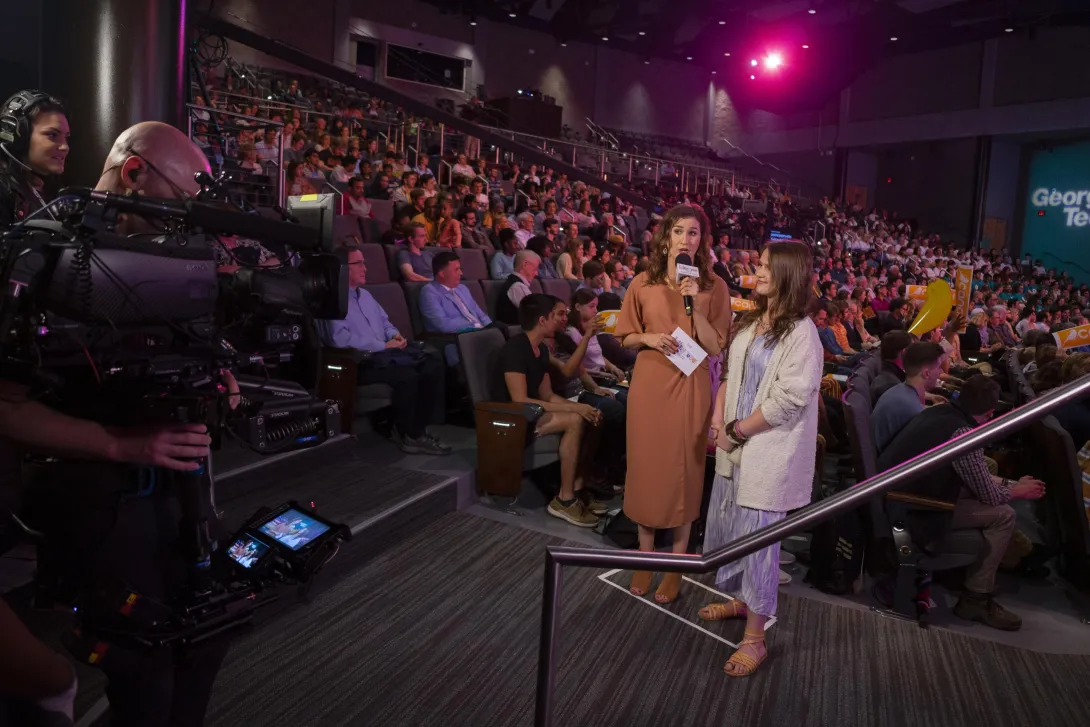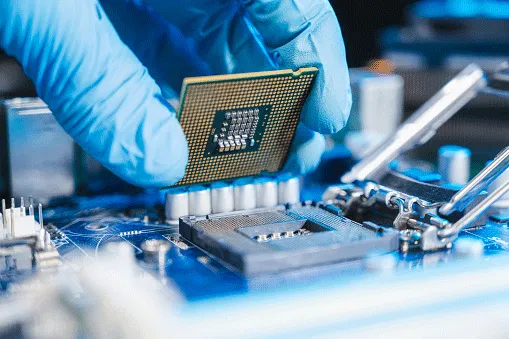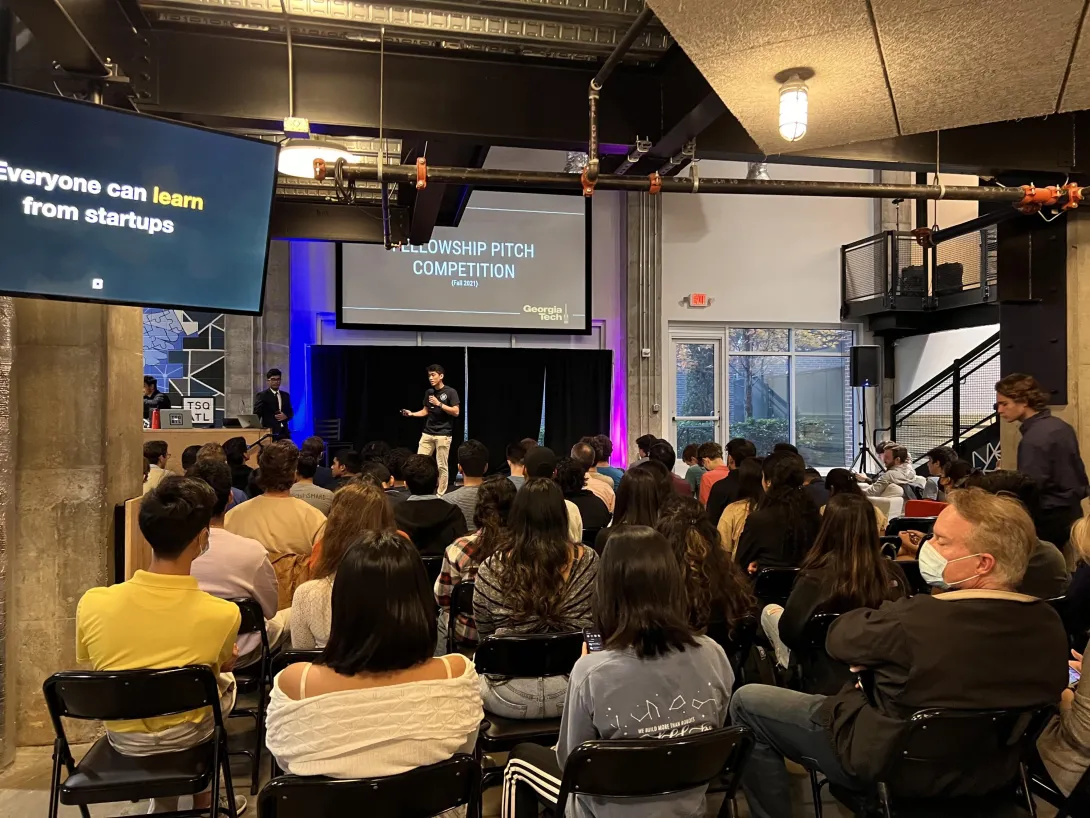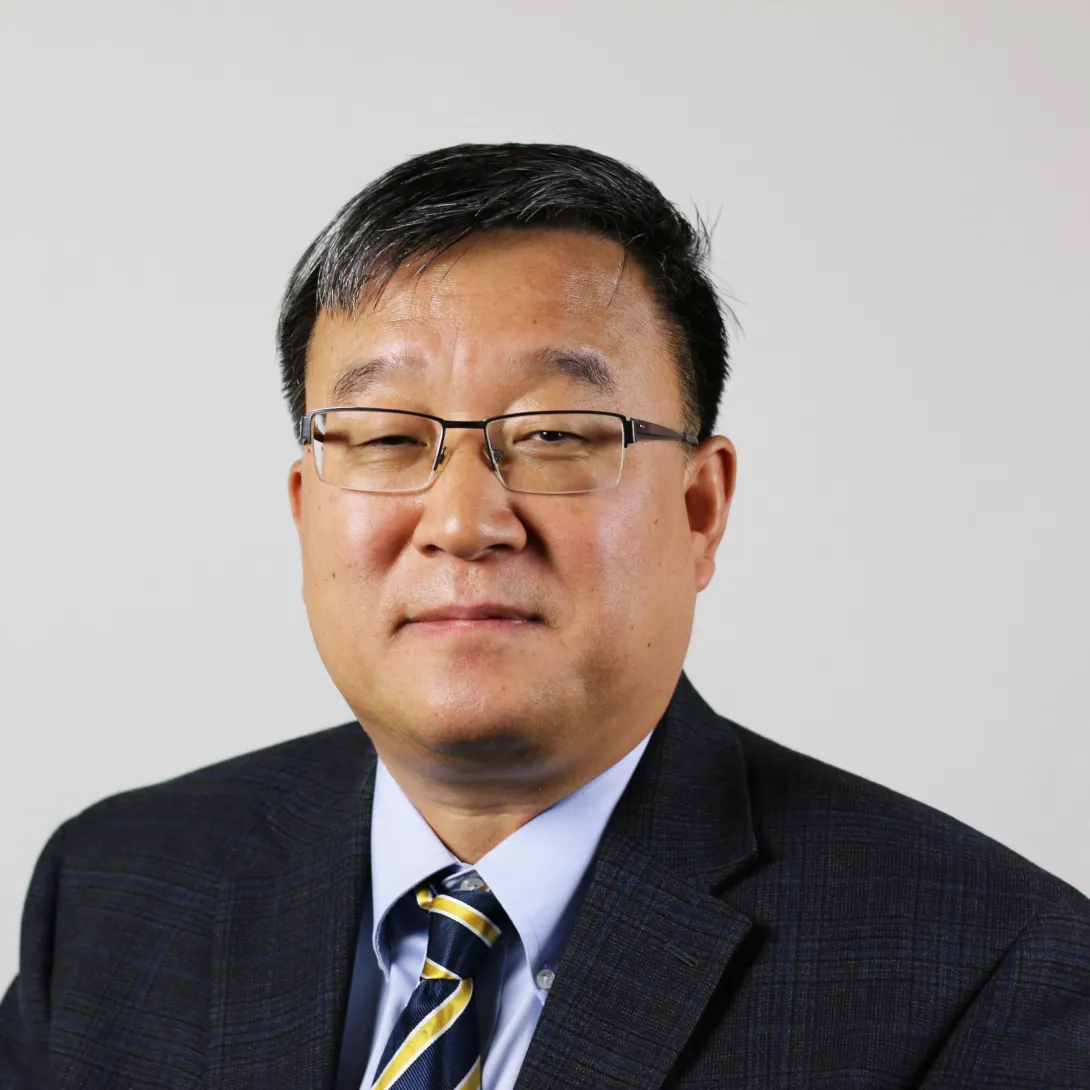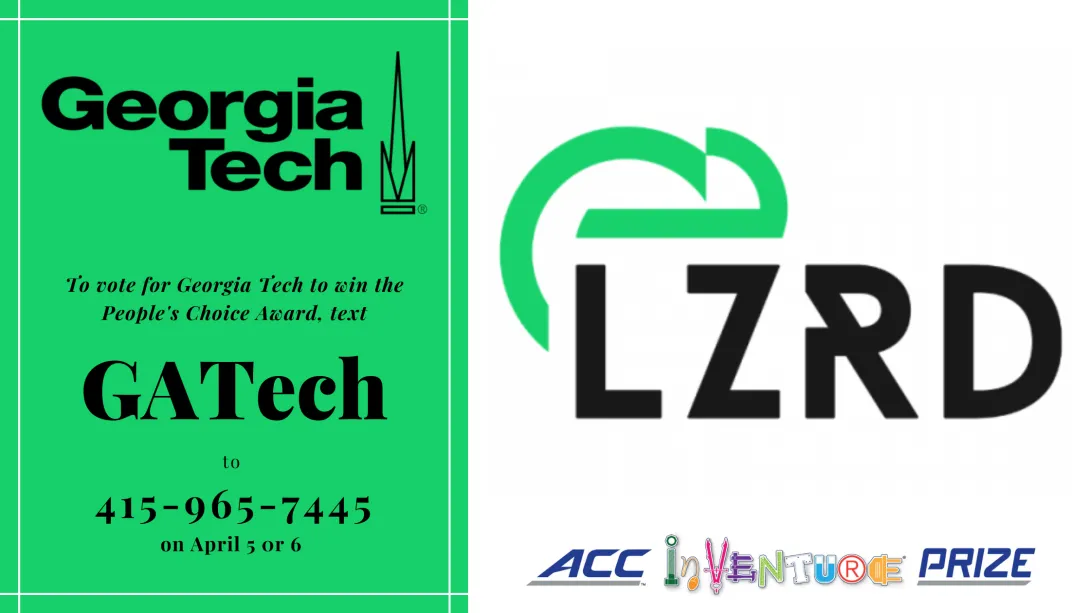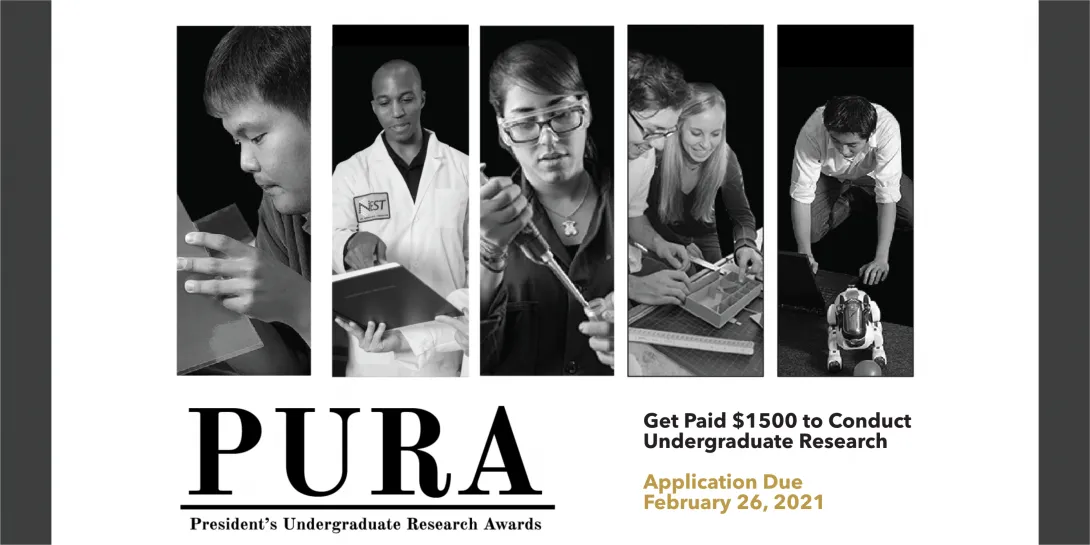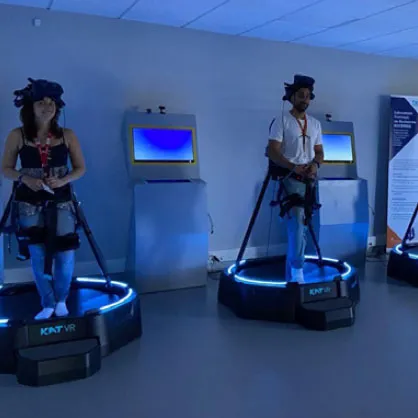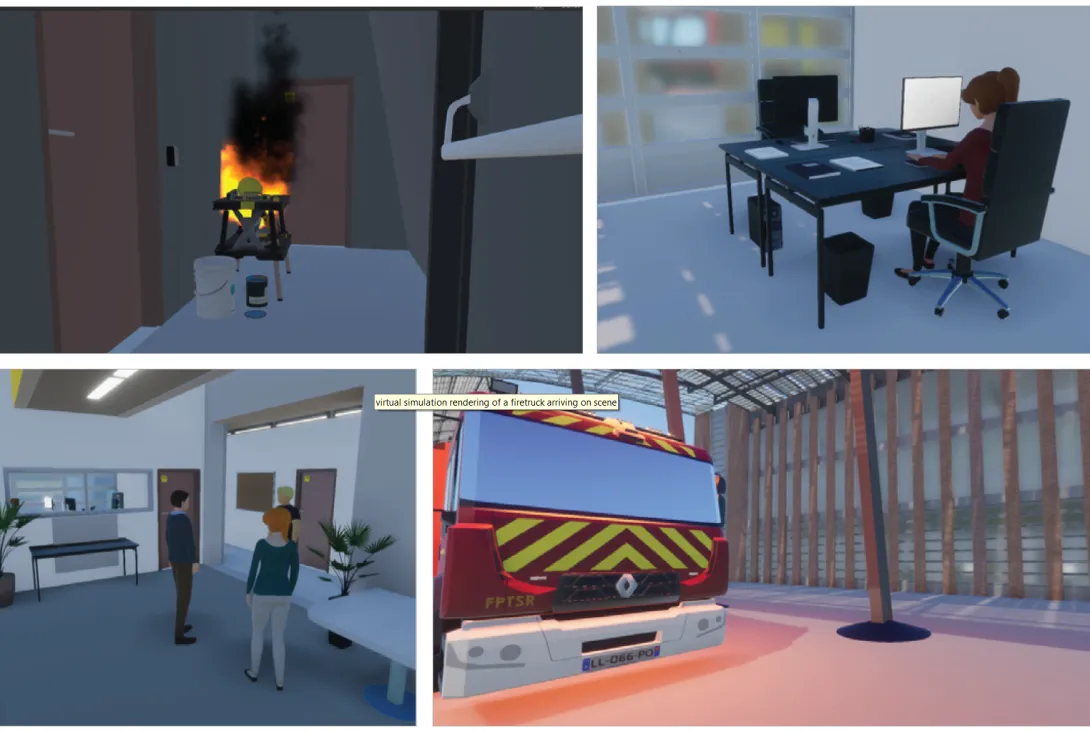Mar. 01, 2022
By Frida Carrera
After almost a year of preparation, practice, and refinement, Georgia Tech’s annual InVenture Prize is down to six finalists competing in the final round on March 16th. In this televised round, the final teams will pitch their inventions to a panel of judges and compete for the top prize of $20,000, assistance in patent-filing, and a spot in CREATE-X’s Startup Launch program.
In its 14th year, the InVenture Prize competition features different innovations created by Georgia Tech students from all disciplines and backgrounds. For months prior to the final round, the finalists received coaching and assistance from mentors and coaches on building their prototypes, developing business models, and rehearsing their pitches to investors. The final six teams were chosen from previous preliminary and semifinal rounds that included a broad range of competitors.
The finals of the InVenture Prize will air live from Georgia Tech’s Ferst Center for the Arts at 7:30 p.m. on March 16th on Georgia Public Broadcasting.
The 2022 finalist teams are:
The Foambuster: The Foambuster is a unique handheld tool that allows construction contractors to drastically cut down on the mess, hassle, and money spent that comes with installing exterior insulation.
Edward Diller, Mechanical Engineering, Los Angeles, CA
Davis Waln, Mechanical Engineering, Atlanta, GA
Christophe Senghor, Mechanical Engineering, Peachtree City, GA
Katelyn Sand, Mechanical Engineering, Westlake Village, CA
Jaime Paris Meseguer, Mechanical Engineering, Spain
Magic Crop: An application that uses the power of Artificial Intelligence and the rule of thirds to format any number of inputted pictures into the perfect headshot within seconds and without ever sending any images to the cloud or to a third-party server.
Megan Dass, Computer Science, Woodbridge, VA
Reflex: Emergency Medical Drone Response System to deliver life-saving medical equipment.
Nevin Gilbert, Computer Science, Boulder, CO
Usman Jamal, Computer Science, Tucker, GA
Sola: Sola provides a data-driven supplemental insurance plan which covers immediate out-of-pocket expenses for US homeowners following losses from tornadoes.
Brayden Drury, Mechanical Engineering, Park City, Utah
Wesley Pergament, Mechanical Engineering, Old Westbury, NY
StrideLink: Accessible gait analysis wearable for remote monitoring of walking asymmetry.
Marzeah (Zea) Khorramabadi, Computer Engineering, Birmingham, AL
Cassandra (Cassie) McIltrot, Biomedical Engineering, Sykesville, MD
Neel Narvekar, Computer Engineering, Arcadia, CA
Tony Wineman, Electrical Engineering, Woodstock, GA
Tabnam: AI-powered shopping assistant that leverages the knowledge of user experience data.
SooHoon Choi, Computer Science, South Korea
Daksh Gupta, Computer Science, Noida, India
Robert (Davis) Liddell, Computer Science, Lutherville, MD
Ethan Perry, Computer Science, Wellesley, MA
To request tickets for the event visit: https://inventureprize.gatech.edu/form/inventure-prize-ticket-request-f
To learn more about InVenture Prize visit: https://inventureprize.gatech.edu/
Jan. 21, 2022
Even a global pandemic cannot slow the acceleration of new technologies and evolving technologies that has become the disruptive norm of our lives over the past decade.
Big data, global connectedness and the digitization of almost everything are driving a whirlwind of change that touches every aspect of our lives.
Georgia Tech continues to be at the center of that of that maelstrom of progress, pushing the cutting edge, developing and influencing advances and being an insistent voice for ensuring those advances are shared as broadly as possible.
Five faculty members share what they see as major forces impacting the coming year and beyond.
Microchip shortage will drive manufacturing to US and other supply chain changes
One of the big technology and supply chain stories of 2021 was the global shortage of microchips that impacted huge parts of the business world. One of the more visible impacts of that shortage was in the automotive field.
According to industry experts, the microchip shortage cost the automotive business $210 billion in revenue in 2020 driving prices up for new and especially used vehicles throughout the year. Dr. Madhavan Swaminathan, Georgia Tech’s John Pippin Chair in Microsystems Packaging and Electromagnetics, says the industry’s focus on finding solutions will bring noticeable change in the coming year.
He says early word of a trend in moving chip manufacturing to the United States will become a big focus in the coming year as well as auto manufacturers and other industries re-examining just-in-time supply decisions as they build inventory.
Advances in addressing bias in AI bolsters inclusion
In computer science circles, it is no longer any sort of surprise that there can be bias in certain applications of artificial intelligence and machine learning. Bias can stem from a range of factors from the data used to software design to the situation where AI is being used.
How to know what to show each user with different world views in search or newsfeeds is quite different than making sure that software used for healthcare works for everyone. For example, sometimes a data set, even a quite large one, may not be representative.
There are close to 100,000 cases of skin cancer in the U.S. a year, and it is difficult to detect, especially the darker someone's skin tone is.
Machine learning researchers are making huge advances in detecting skin cancer, but a big limit is that the data they are using comes from light-skinned populations.
Knowing this problem exists opens the door to using data and artificial intelligence to improve detection for all. Dr. Deven Desai, a law and ethics professor in Georgia Tech’s Scheller College of Business, says in the coming year, because this potential for bias is known, we will become much better at identifying bias from wherever it may come and addressing it to limit harm.
The focus in the coming year will be on making the searching and sifting tools of AI and machine learning more attuned to potentially skewed results. This focus will bring better, more inclusive results.
Watch the video: A Good Challenge: The Future of AI
Digital twins drive safety, efficiency and savings in construction
Think of them as the ultimate in interactive blueprints that can actually communicate to owners about building performance. The idea of a digital twin is not new. Building an exact match, digital version of a construction project is commonplace in construction now and has been for years. Architectural drawings, CAD images, or BIM images would all be considered “twins” in a way.
The advances that are happening now with true digital twins and that will be taking off in the coming year are in what you can do with and learn from a much more robust digital twin.
"Digital twinning is about the building and all the components that are in the building. Where they are, what condition they're in, all kinds of qualities," says Russell Gentry director of the Digital Building Lab at Georgia Tech.
In the coming year, Gentry expects the idea of using a digital twin will grow as its uses expand - monitoring for maintenance needs, identifying potential problems like leaks or water damage, dialing in HVAC system efficiencies - just a few of the changes that are happening or soon will be. Digital twins will be used to improve building safety, efficiency and even retrofitting existing buildings with new and improved technologies.
The automation and improvements that can be achieved will be a powerful force in construction and building management.
Technology led up-skilling drives job agility that will increase worker satisfaction and productivity
In the U.S. alone, November 2021 saw more than four and a half million people quit their jobs, the biggest spike on record and continuing a streak of transition and upheaval. As the pace of change continues to increase, we need to be able to rapidly reconfigure workforces to address new challenges.
Ashok Goel, professor of computer science and human-centered computing in the School of Interactive Computing, has been watching the rapid changes in the job market. He sees technology as a solution to reskilling employees.
“It is critical that we leverage technology to develop better tools to sync up employers and educators so that job seekers have clear paths to reskilling,” Goel says.
Using AI to match workers to jobs, to improve job performance and satisfaction are just a few of the efforts in the coming year that will ultimately result in improved worker well-being and productivity as well.
Covid public health crisis leads to public policy evolution
The pandemic has defined very clearly a strain in the relationship between scientists and some segments of the general public.
Some public policy makers, as a reflection of that divide, have made decisions related to public health that do not always match generally accepted science. For academic leaders in public policy like Dr. Cassidy Sugimoto, the Marie Patton School Chair in the School of Public Policy at Georgia Tech, this is one of the biggest challenges our society and people making public policy will face in the coming years.
Bridging the divide made clear by Covid and building the relationships that will result in better policy will be an effort that will have impact for decades.
“In many ways we’re setting the stage for the other looming global crises that we’re being faced with like climate change, like issues around social justice.
All of those are going to take the same kind of navigation in communication between the public between science and between policy makers and not just within regions but globally,” said Sugimoto.
It’s a challenge that she and her colleagues have dedicated their careers to taking on.
Watch: Public Policy and the Pandemic
For more trends and in-depth predictions, read: The Year Ahead: Trends to Watch in 2022
News Contact
Blair Meeks
Assistant Vice President External Communications
wmeeks7@gatech.edu
404-894-9793
Jan. 21, 2022
This country’s semiconductor chip shortage is likely to continue well into 2022, and a Georgia Tech expert predicts that the U.S. will need to make major changes to the manufacturing and supply chain of these all-important chips in the coming year to stave off further effects.
That includes making more of these chips here at home.
Madhavan Swaminathan is the John Pippin Chair in Electromagnetics in the School of Electrical and Computer Engineering. He also serves as director of the 3D Systems Packaging Research Center.
As an author of more than 450 technical publications who holds 29 patents, Swaminathan is one of the world’s leading experts on semiconductors and the semiconductor chips necessary for many of the devices we use every day to function.
“Almost any consumer device that is electronic tends to have at least one semiconductor chip in it,” Swaminathan explains. “The more complicated the functions any device performs, the more chips it is likely to have.”
Some of these semiconductor chips process information, some store data, and others provide sensing or communication functions.
In short, they are crucial in devices from video games and smart thermostats to cars and computers.
Our current shortage of these chips began with the Covid-19 pandemic. When consumers started staying at home and car purchases took a downward turn, chip manufacturers tried to shift to make more chips for other goods like smartphones and computers.
But Swaminathan explains that making that kind of switch is not simple. Entire production operations have to be changed. The chips are highly sensitive and can be damaged by static electricity, temperature variations, and even tiny specks of dust. The manufacturing environments must be highly regulated, and changes in the process can add months.
The pandemic highlighted another challenge with the semiconductor chip industry, according to Swaminathan.
“There’s a major shortage of companies making chips,” he says. “If you look worldwide, there are maybe four or five manufacturers making 80-90% of these chips and they are located outside of the United States.”
This creates supply chain hiccups with the raw supplies needed to make these chips as well. Add in the fact that many of these companies only design their chips – they don’t manufacture them directly.
“American consumers use 50% of the world’s chips,” Swaminathan says, which creates a serious challenge when the overwhelming majority of those chips are manufactured in other nations.
In the short term, the costs of the chip shortage is being passed on to the consumer. We see this directly with products like PlayStations and Xboxes that are more and more expensive and harder to purchase when the chips necessary for the consoles to function are in short supply.
Beyond 2022, Swaminathan says we need to work to revitalize the industry domestically.
“We need to bring more manufacturing back to the United States,” he says. “The U.S. government has recognized the importance of this semiconductor chip shortage and is trying to address the issue directly.”
That means investing in new plants to manufacture the chips, but America's journey toward chip self-sufficiency will continue to be a work in progress.
“This is a cycle,” Swaminathan explains. “But this is probably the first time where it has had such a major effect in so many different industries.”
But consumers can take direct action on their own in the coming year. “Reduce the number of times you purchase or upgrade electronic devices like phones and cars,” he says. “Then it becomes just a supply problem, not a demand and supply problem.”
Dec. 10, 2021
By Frida Carrera
On December 3, 2021, Startup Exchange presented the Fall 2021 Fellowship Pitch Competition sponsored by the Georgia Tech Student Innovation Program, Office of Undergraduate Education. The event took place at ATL Social Club in Tech Square, a major startup hub situated on Georgia Tech’s campus and perfect for those eager for innovation at GT. The event also welcomed partner companies and recruiters such as NCR and Stord.
At this pitch-style event, six founder teams presented their innovative pitches and competed for first, second, and third place, each with a cash prize to aid in the advancement of their ideas. The first and second place winners of the competition were determined by three guest judges: Kathryn Petralia, co-founder of Kabbage and Drum; Thomas Suarez, co-founder of Teleport and Thiel Fellow; and Evan Jarecki, serial entrepreneur and BM at Startup Atlanta. The event commenced with a brief introduction by Startup Exchange executive board members, followed by presentations from the 6 teams including Fino, InSite, Jargon, and Tokenstack. After hearing each team’s pitch, the judges had time to deliberate and select the top two winners while the audience voted for the People’s Choice winner. Meanwhile, attendees were also able to hear from the partner companies and network while enjoying free perks such as food and beverages.
“There are students everywhere across campus really starting on their start-ups and pursuing their dreams. Atlanta is a growing city and Georgia Tech is the perfect hub for that. These teams, we’re introducing them to entrepreneurship and giving those resources and intro-connections. By doing so, we’re inspiring them in a way. It’s just a great learning experience for them,” explained Startup Exchange’s Director of Fellowship Revanth Tiruveedhi.
Following the intermission, the judges presented the first-place award of $750 to Jargon, a browser extension that points out red flags in user contract agreements, as pitched by team members Kaleb Rasmussen and Devansh Khunteta. Second place of $500 was awarded to Eartheal by team members Colin Burnett, Philip Colt, Neal Austensen, and Brandon Sherrard. People's Choice of $250 was awarded to Tokenstack by team members Nitin Paul, Samrat Sahoo, Yatharth Bhargava, and Mohit Sahoo. The event then closed with remarks by Startup Exchange’s board members and photos with the participants.
To learn more about student innovation at Georgia Tech visit https://innovation.gatech.edu/
Nov. 03, 2021
Jianjun (Jan) Shi, Carolyn J. Stewart Chair and professor in the H. Milton Stewart School of Industrial and Systems Engineering, has been selected for the Society of Manufacturing Engineering’s (SME) 2021 College of Fellows. This is an honor given to individuals “who have made outstanding contributions to the social, technological, and educational aspects of the manufacturing profession,” with 20 or more years of dedication and service to the field.
In the letter nominating Shi for this honor, it was noted that he pioneered data-enabled manufacturing – an accomplishment for which he was also elected to the National Academy of Engineering in 2018. He has developed quality improvement algorithms implemented in over 40 steel plants globally, with hundreds of millions of dollars saved and over one billion KWh in saved energy, as well as tens of thousands of CO2 emissions reduced.
Shi’s selection as an SME Fellow is the latest in a series of signal distinctions conferred in 2021: He received the Walter Shewhart Medal from the American Society for Quality, an award given “to individuals who have made outstanding technical contributions and leadership in the field of modern quality control and improvement.” He was also awarded the S.M. Wu Research Implementation Award, which “honors outstanding original research … that, upon implementation, has had a significant commercial/societal impact.”
Previously, Shi has also been named a Fellow of the Institute of Industrial and Systems Engineering, a Fellow of the American Society of Mechanical Engineering, a Fellow of INFORMS, an Elected Member of the International Statistical Institute, and an Academician of the International Academy for Quality. His work has also been honored with, among others, 11 best paper awards and nine international research awards.
Shi said, “I am honored to receive this recognition, and I greatly appreciate all my students, colleagues, and sponsors for their support throughout my many years of research in and implementation of complex manufacturing systems.”
Jul. 20, 2021
According to Chelsea White, professor in the Georgia Tech Manufacturing Institute, “supply chains don’t like disruptions—especially low-cost supply chains—and they’re all low cost.”
White is the Schneider National Chair in Transportation and Logistics and professor in the H. Milton Stewart School of Industrial and Systems Engineering at Georgia Tech.
“When demand is smooth and supply is balanced with demand, supply chains run well and inexpensively,” said White.
However, covid has caused dramatic drops and increases in demand, thus adding to supply disruptions. A rapid recovery in the United States has helped spike that dramatic increase.
In addition to dramatic demand flucuation, the supply side of this was also interrupted with shipping workers in China contracting covid, reducing the capacity to move goods out of major Chinese ports. With the dramatic rise in demand, congestion has been causing further delays even though the supply chains have plenty of capacity according to White.
White says some of this lack of smooth supply and demand is self-inflicted, “container ships have gotten much bigger, naturally causing surges all over the freight transportation system – ocean carriers, rail, and trucks. The tariffs kicking in caused ‘front loading,’ which we’re seeing now to ensure shelves will be stocked during the holidays at the end of the calendar year.”
“We’re finding out that the global freight transportation system is less resilient than originally thought,” said White. “My prediction for 2021 is there will be toys on the shelves for the Christmas holidays, but perhaps not as many toys and their prices may be higher.”
Chelsea White, along with other experts, were recently interviewed by CBS News in Atlanta, Georgia. You can view White’s interview and learn more about the supply chain crisis topic here: CBS46 News, Supply Chain Crisis Forcing Shoppers to Buy Early.
News Contact
Apr. 05, 2021
By Jessica Barber
On April 21, 2021, biomedical engineering student Michael Pullen will serve as Georgia Tech’s representative in the fifth annual ACC InVenture Prize. Here he will compete with teams from twelve other universities for the chance to take home $30,000 in prizes.
Pullen’s invention first took root when he experienced the struggle of getting turf burn while playing football. While most players seek protection through regular compression sleeves, this often leads to decreased grip, more fumbles, and difficulty in maneuvering plays.
While working in sports medicine with the Atlanta Falcons, Pullen found a way to directly avoid this problem. LZRD Sleeve is a compressive sleeve that integrates gripping and moisture-wicking technology to deliver protection and control without sacrificing mobility nor comfort.
Since then, LZRD Sleeve has secured its place in non-athletic arenas. A year ago, the world of sports halted due to COVID-19 shutdowns. It was then that Pullen sought other applications for his innovative sleeve — LZRD Sleeve has expanded its market to delivery drivers, gardeners, and maintenance workers seeking better performance and protection from harm.
LZRD Sleeve is now being used by the largest U.S. courier service, and it has also been featured in Neil DeGrasse Tyson’s podcast StarTalk. On the same hand, Pullen has been in contact with a whopping five Fortune 500 companies. He ultimately hopes that InVenture Prize will show that with hard work, nothing is impossible.
“Never in a million years would I have thought I would be representing Georgia Tech in the ACC InVenture Prize. Getting out of your comfort zone and trying new things is important, and by winning, I hope to set an example so that others might do the same,” Pullen stated.
Overall, winning the ACC InVenture Prize would allow LZRD Sleeve to expand even further through capital investments, uptakes in production, and coverage of associated legal fees.
The Georgia Tech community is encouraged to show Pullen its support through voting for the People’s Choice Award of $5,000. Voting is open from 8 a.m. on Monday, April 5 until midnight on Tuesday, April 6.
To vote, please text GATech to win the ACC InVenture Prize People’s Choice Award to 415-965-7445.
Winners will be announced on Wednesday, April 21 at 7 p.m. on PBS stations throughout the ACC region.
More information about LZRD Sleeve can be found at lzrdtech.com.
News Contact
Recha Reid
Office of Undergraduate Education
Feb. 21, 2021
The President's Undergraduate Research Award pays selected students $1500 to conduct undergraduate research. Applications for summer 2021 funding are due on February 26, 2021.
Apply online at urop.gatech.edu
Jan. 29, 2021
The American Society for Quality (ASQ) announced that Jianjun “Jan” Shi has been awarded the 2021 Walter Shewhart Medal. ASQ cited Shi for "his creative development and implementation of engineering-driven data fusion methodologies to achieve in-process quality improvements (IPQI) in manufacturing systems." Professor Shi is the Carolyn J. Stewart Chair in Georgia Tech’s H. Milton Stewart School of Industrial and Systems Engineering (ISyE). The Shewhart Medal is given to individuals who have made outstanding technical contributions and leadership in the field of modern quality control and improvement.
Shi’s work focuses primarily on the development and application of data-enabled manufacturing. His methodologies integrate system informatics, advanced statistics, and control theory for the design and operational improvements of manufacturing and service systems by fusing engineering systems models with data science methods. The technologies developed in Shi’s research group have been widely implemented in various production systems with significant economic impacts. Additionally, he is the founding chair of the Quality, Statistics and Reliability Division at the Institute for Operations Research and Management Science (INFORMS).
“Congratulations to Jan on winning this prestigious award,” said ISyE School Chair Edwin Romeijn. “His unmatched work in the development and application of data-enabled manufacturing and quality control have made him a true leader in this field. We are proud to have him as a longstanding member of our faculty.”
The Shewhart Medal is the latest in a long line of honors Shi has received for his research. These include the ASQ Brumbaugh Award (2019); the Horace Pops Medal from Wire Association International (2018); and the IISE David F. Baker Distinguished Research Award (2016). In 2018, he was elected to the National Academy of Engineering for "development of data fusion-based quality methods and their implementation in multistage manufacturing systems.”
“I feel extremely honored and humbled to receive the 2021 Walter Shewhart Medal,” said Shi. “The development and implementation of IPQI requires a team effort. I would like to take this opportunity to express my appreciation to my current and former students, collaborators, and sponsors, as well as many people’s efforts to implement the IPQI methodologies in industrial systems.”
Shi has been a faculty member of ISyE since 2008. Prior to his arrival at Georgia Tech, he was the G. Lawton and Louise G. Johnson Professor of Engineering at the University of Michigan.
Dec. 15, 2020
The Georgia Tech Supply Chain and Logistics Institute (SCL) is the largest such group in the world, and it provides researchers with many opportunities to help solve global supply chain and logistics problems. The latest addition is the SIReN (Sentient Immersive Response Networks) Lab, dedicated to research leveraging immersive technologies to enhance human capabilities for engineering and managing supply chains and logistic systems.
The SIReN Lab is an associate international laboratory, the result of a partnership between SCL’s Physical Internet Center and IMT Mines Albi, part of the Mines-Telecom Institute in France. The two organizations have historically collaborated on research surrounding artificial intelligence and its interface with these immersive technologies. The SIReN Lab is an extension and formalization of that relationship.
The U.S. arm of the lab is housed in the H. Milton Stewart School of Industrial and Systems Engineering (ISyE) and is directed by Benoit Montreuil, Coca-Cola Material Handling & Distribution Chair and professor in ISyE. Montreuil is also co-director
of SCL and director of the Physical Internet Center. The French lab is led by Frederick Benaben, head of the Interoperability of Organizations research team at IMT Mines Albi. Because of the virtual nature of the work, it is possible to have researchers from both labs working on the same experiment, in the same environment, at the same time.
SIReN Lab research is centered around four main types of response networks — demand, health, humanitarian, and crisis — and the human response to them. A demand response network focuses on how the supply network responds to demand and how to prepare for this response, rather than the other way around. The health and humanitarian response networks, which have become increasingly visible due to the Covid-19 pandemic, relate to issues like disaster recovery and various healthcare supply chains.
The French lab has a significant emphasis on crisis response networks, in which a group of people work together to respond to a crisis in a smart, fair, and efficient manner.
“We currently have a crisis management project where 10 people in France and a few in the U.S. are working together at the same time in a digital twin environment,” said Benaben. “For example, we can have everyone in a building where they can fight a fire, but we can also have some of them in a virtual control room exchanging ideas and making decisions. The options are limitless.”
Researchers are using tools such as dashboards, simulations, games, and in some cases virtual or augmented reality to allow participants to see — and in some cases experience — a vivid picture of a situation with other players in the network.
“In augmented reality, we reinforce what participants see with facts, maps, graphs, and other information that enhance what they are experiencing,” explained Montreuil. “In virtual reality, we project the user into a virtual world, which can be a very vivid representa-tion of the current world, or it can be an abstract world. It can be a very powerful tool.”
“When we put someone in an environ-ment where they can touch, learn, train, experiment, and ultimately decide, it changes the way they approach the problem,” added Benaben.
The French lab launched on Nov. 15, 2019. While the spring 2020 launch of the U.S. lab was postponed due to the Covid-19 pandemic, the team already has several projects underway and is fully operational. Eventually, they would like to see additional SIReN labs join the network to further scale the work being conducted.
“We want to become a global leader in making response networks become more sentient and immersive,” said Montreuil. “This is an exciting new approach that we are bringing to ISyE and to the domain.”
News Contact
Laurie Haigh
Communications Manager
Pagination
- Previous page
- 3 Page 3
- Next page
